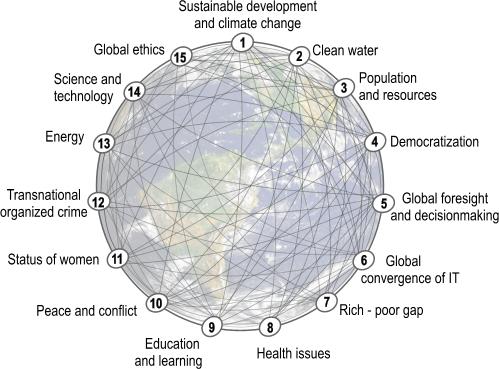The 15 Global Challenges provide a framework to assess the global and local prospects for humanity. Their description, with a range of views and actions to addressed each, enriched with regional views and progress assessments are updated each year, since 1996. A short overview is published in the annual State of the Future,while continuous updates and details are available on the Global Futures Intelligence System website: https://themp.org. The 15 Global Challenges are a result of continuous research, Delphi studies, interviews, and participantion of over 4,000 experts from around the world, since 1996 — see a short history.
The Global Challenges are transnational in nature and transinstitutional in solution. They cannot be addressed by any government or institution acting alone. They require collaborative action among governments, international organizations, corporations, universities, NGOs, and creative individuals. Although listed in sequence, Challenge 1 on sustainable development and climate change is no more or less important than Challenge 15 on global ethics. There is greater consensus about the global situation as expressed in these Challenges and the actions to address them than is evident in the news media.
The 15 Global Challenges:
1. How can sustainable development be achieved for all while addressing global climate change?
2. How can everyone have sufficient clean water without conflict?
3. How can population growth and resources be brought into balance?
4. How can genuine democracy emerge from authoritarian regimes?
5. How can decisionmaking be enhanced by integrating improved global foresight during unprecedented accelerating change?
6. How can the global convergence of information and communications technologies work for everyone?
7. How can ethical market economies be encouraged to help reduce the gap between rich and poor?
8. How can the threat of new and reemerging diseases and immune micro-organisms be reduced?
9. How can education make humanity more intelligent, knowledgeable, and wise enough to address its global challenges?
10. How can shared values and new security strategies reduce ethnic conflicts, terrorism, and the use of weapons of mass destruction?
11. How can the changing status of women help improve the human condition?
12. How can transnational organized crime networks be stopped from becoming more powerful and sophisticated global enterprises?
13. How can growing energy demands be met safely and efficiently?
14. How can scientific and technological breakthroughs be accelerated to improve the human condition?
15. How can ethical considerations become more routinely incorporated into global decisions?
Each Challenge has the following menu:
1. Situation Chart: Current situation, desired situation, and policies to address the gap
2. Report: Short overview as presented in this chapter, but continuously updated, followed by detailed content, suggested actions, and other relevant information, totalling some 100–300 pages (depending on the Challenge)
3. Digest: Dashboard-like display of latest information related to the Challenge
4. Updates: Latest edits to the reports and situation charts
5. Scanning: Important information that impacts the Challenge
6. News: Latest news relevant to the Challenge
7. Real-Time Delphi: Questionnaire software that lets users ask questions at any time and define sub-questions
8. Discussion: A blog-like area where subscribers and reviewers discuss issues they would like to explore
9. Comments: comments made by users on any part of the system, organized by time
10. Models: Interactive computer models that can show trends of the Challenge
11. Questions: Suggested questions to experts
12. Resources: Collection of websites, books, videos, presentations, and papers/articles relevant to the respective Challenges
Subscribers have access to the entire menu listed above, to discussions, as well as the entire research of The Millennium Project since 1996.
Readers are invited to contribute their insights to improve the overview of these 15 global challenges for future editions.


